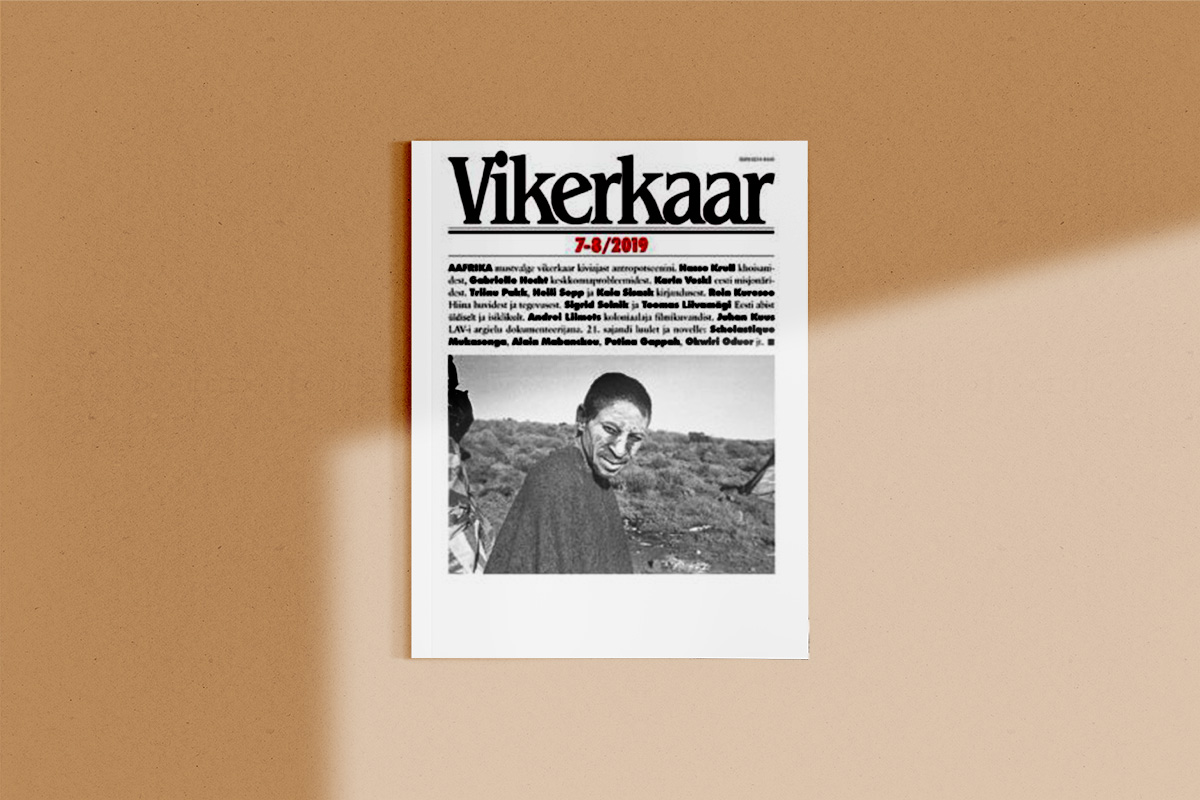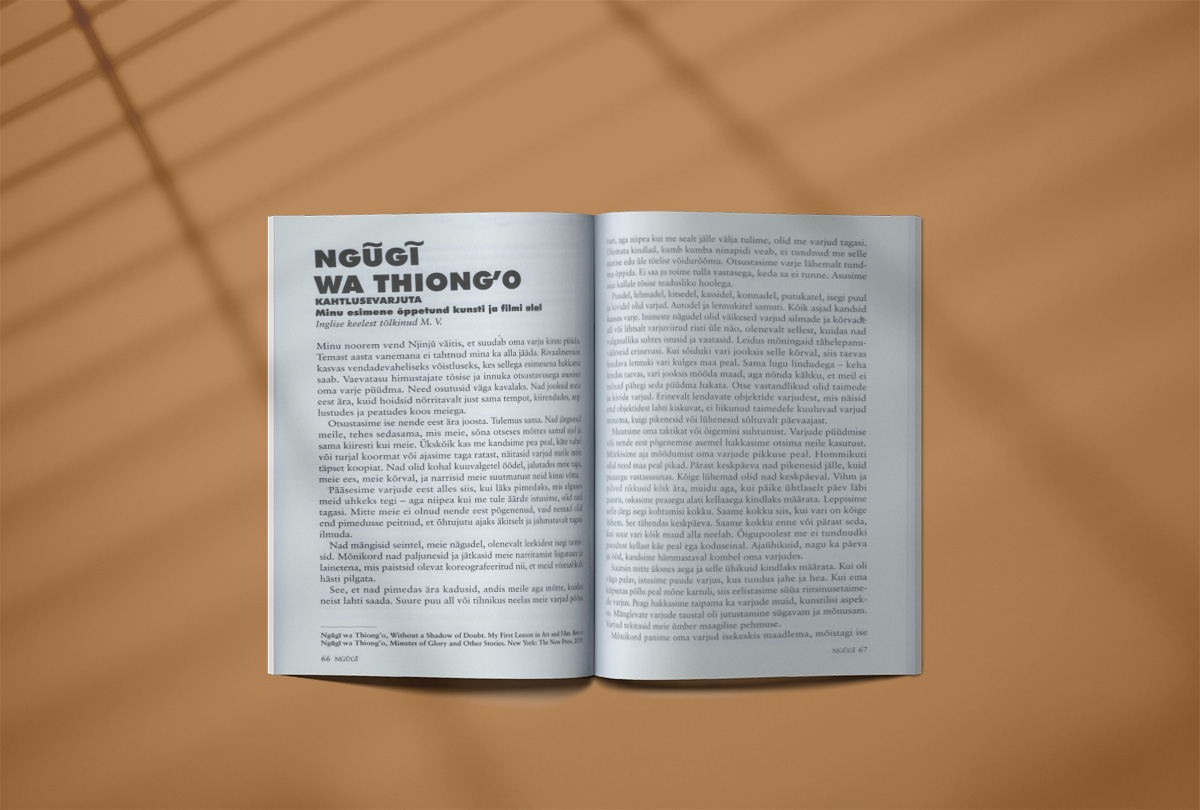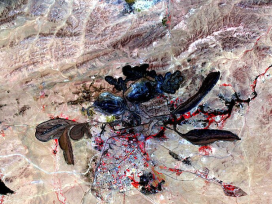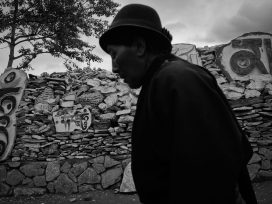 From the environmental crisis to latest literary trends – Africa is at the heart of Vikerkaar’s summer issue. A selection of Damara and Nama trickster tales opens the issue, which surveys the writings of Yvonne Vera, Scholastique Mukasonga, Liyou Libsekal, and Alain Mabanckou, among others. The historian Gabrielle Hecht argues that the age of the Anthropocene looks remarkably different when seen from Africa, where local environments both enable forms of western wealth and shoulder the ecological costs – but not forever. Other essays echo similar themes.
From the environmental crisis to latest literary trends – Africa is at the heart of Vikerkaar’s summer issue. A selection of Damara and Nama trickster tales opens the issue, which surveys the writings of Yvonne Vera, Scholastique Mukasonga, Liyou Libsekal, and Alain Mabanckou, among others. The historian Gabrielle Hecht argues that the age of the Anthropocene looks remarkably different when seen from Africa, where local environments both enable forms of western wealth and shoulder the ecological costs – but not forever. Other essays echo similar themes.
Development
Rein Kuresoo surveys the impact of Chinese investment in Africa. China currently holds over twenty per cent of the debt of African nations, and that’s without counting private investment. However, the environmental costs of Chinese interests have been heavy: dramatic drops in elephant and rhinoceros populations; depletion of fisheries and the introduction of new invasive species; deforestation and unsustainable mining. The social consequences of Chinese investment – displacement of local businesses, acquisition of strategic industries such as airports and power plants in Zambia – are also becoming increasingly apparent, although the profits remain appealing as well.

Tricksters
Hasso Krull surveys recent works in anthropology and philosophy, arguing that the culture of the bushman in South Africa appears to us today as an ‘anarchist utopia’. These ancient, resilient civilizations offer a way of understanding history and human society as being bound with the non-human in ways we can barely understand.
Krull concludes: ‘History is a trickster. The trickster is a hunter-gatherer, a wild and primordial self/reflection, expressing our constant vibration on the boundary between the human and the non-human, whether we admit to it or not. The last few thousand years have been a consistent motion towards ever increasing denial … After the explosive spread of the term ‘Anthropocene’, it has become clear that the days of this denial are numbered. We live in a wild cosmos and it would be smart to accept this fact as soon as possible. This is where the Bushmen, our kind siblings, ancestors of our ancestors can help us out.’
Also: Sigrid Solnik points out the distance between Estonia’s rhetoric of development and its haphazard and inconsistent actions; and Andrei Liimets inspects the hauntings of colonialism on film, from the works of Rachid Bouchareb to Marvel’s Black Panther.
This article is part of the 14/2019 Eurozine review. Click here to subscribe to our reviews, and you also can subscribe to our newsletter and get the bi-weekly updates about latest publications and news on partner journals.
More articles from Vikerkaar in Eurozine; Vikerkaar’s website

 From the environmental crisis to latest literary trends – Africa is at the heart of Vikerkaar’s summer issue. A selection of Damara and Nama trickster tales opens the issue, which surveys the writings of Yvonne Vera, Scholastique Mukasonga, Liyou Libsekal, and Alain Mabanckou, among others. The historian Gabrielle Hecht argues that the age of the Anthropocene looks remarkably different when seen from Africa, where local environments both enable forms of western wealth and shoulder the ecological costs – but not forever. Other essays echo similar themes.
From the environmental crisis to latest literary trends – Africa is at the heart of Vikerkaar’s summer issue. A selection of Damara and Nama trickster tales opens the issue, which surveys the writings of Yvonne Vera, Scholastique Mukasonga, Liyou Libsekal, and Alain Mabanckou, among others. The historian Gabrielle Hecht argues that the age of the Anthropocene looks remarkably different when seen from Africa, where local environments both enable forms of western wealth and shoulder the ecological costs – but not forever. Other essays echo similar themes.






